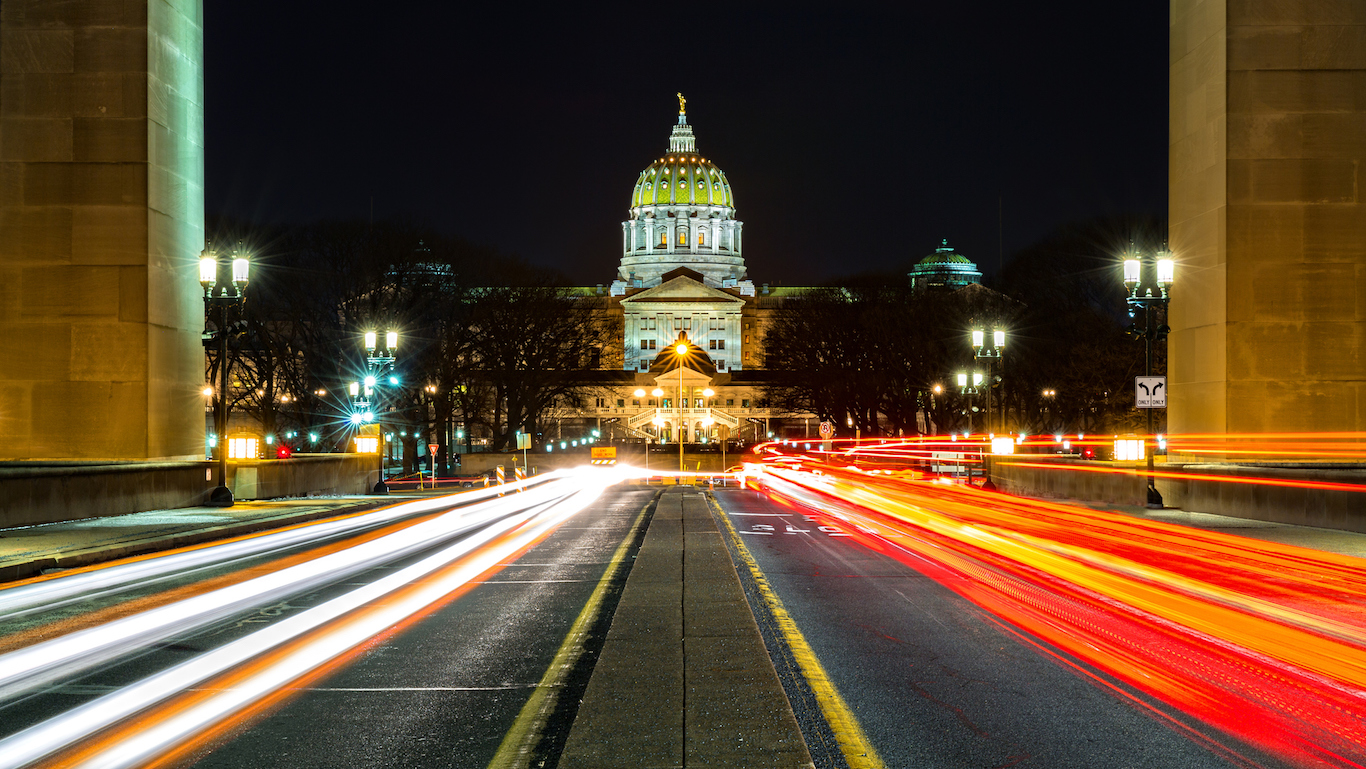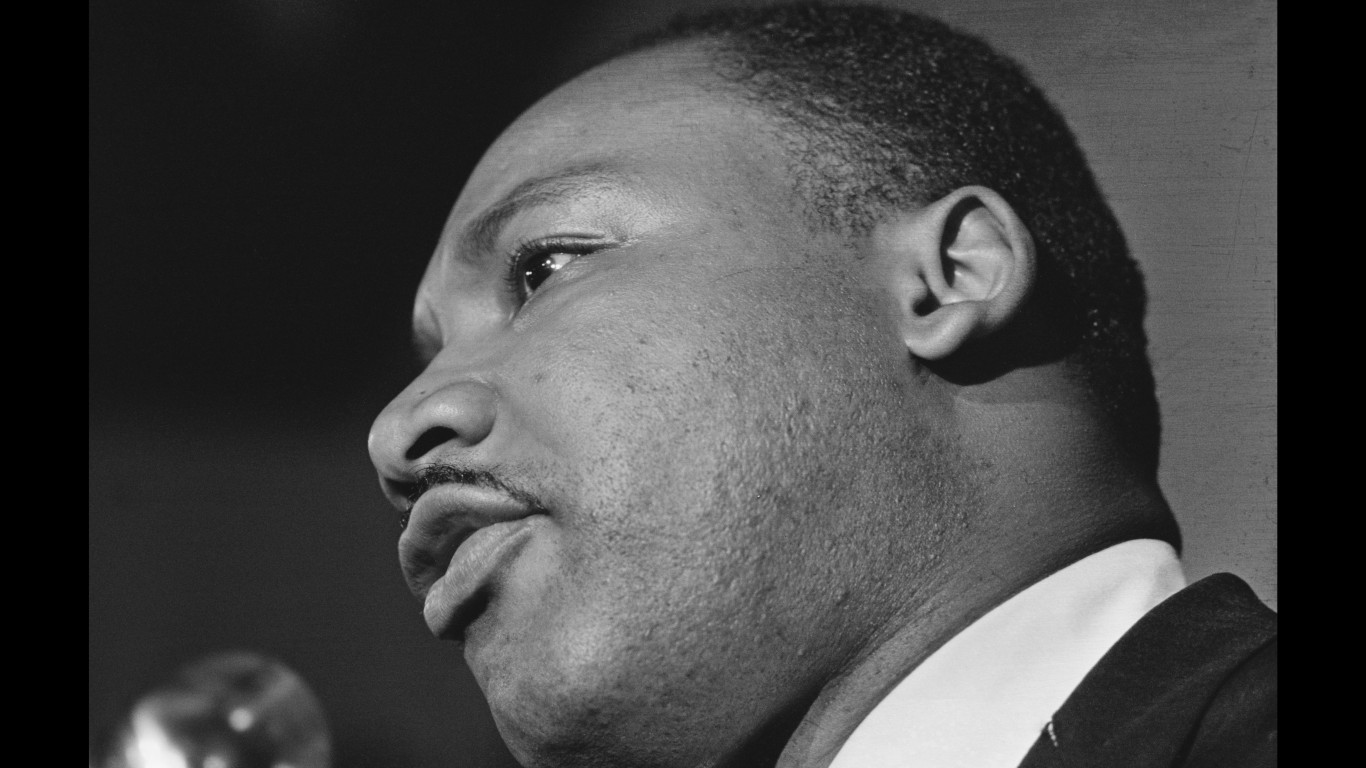
Smoking, drinking, gambling, and other vice-like habits are widely believed to be harmful — not just to the individuals who drink, smoke, or gamble, but to society at large. Some states levy so-called “sin taxes” on such products or otherwise profit from such behaviors. Whether these taxes effectively deter residents from harmful behavior, or whether tax policy is the appropriate tool to address such problems, may be open questions. Whether the state is right to profit from such behavior is yet another question. In any case, a handful of states have profited immensely from these tax policies.
24/7 Wall St. reviewed state revenue from tobacco, alcohol, and casino taxes. We also considered profits from state-owned liquor and lottery systems. In a few states, massive marijuana industries have formed in the last several years, and have recorded extraordinary profits. However, even considering those revenue streams, Alaska, Colorado, Oregon, and Washington — the four states where some form of recreational marijuana has been legalized — did not make this list. Rhode Island leads the nation with $858.7 million generated from such sources, accounting for 9.5% of the state’s total revenue. Michigan rounds out the list in ninth place with 3.4% of annual revenue generated from taxing behaviors deemed harmful to society. Nationwide, 2.3% of government revenue comes from supposed sins.
[in-text-ad]
Of the potentially harmful behaviors considered, gambling is most frequently the largest source of sin-related revenue for states. Lottery sales, which are nearly always controlled by state governments, or casino taxes were the largest drivers of revenue in all but two of the nine states.
Click here to see the 9 states profiting from sin
Nationwide, the government generates profits of $21.3 billion from lotteries and casino taxes, or approximately 1% of total revenue. Lottery ticket sales alone accounted for less than 3% of revenue in only one of the states profiting the most from sin.
Using tax policy to regulate behavior is controversial. The added taxes increase the cost of consuming unhealthy products such as cigarettes. For proponents of such tax policies, this generates more revenue to fund government programs, while discouraging people from engaging in such harmful activities at the same time. Some states may have had a modicum of success penalizing these behaviors, as the 10 states with the highest tobacco tax rates all have below-average smoking rates.
There are plenty of exceptions, however. Michigan, for example, levies one of the highest tax rates on spirits. Yet, liquor sales in the state are higher than in all but only a few states and make up one of the largest shares of state revenue. Similarly, in Pennsylvania, a high tax on alcohol was seemingly not needed to discourage drinking. The state reports one of the lowest excessive drinking rates and also has one of the lowest tax rates on beer and liquor.
For some, taxing these behaviors is the wrong approach even if it does effectively lower the likelihood of people engaging in harmful activities. In a report published in 2012, Scott Drenkard, a researcher at the Tax Foundation, argued that tax policy is a crude instrument and should not be used to regulate people or guide them towards healthier choices. For Drenkard and like-minded Americans, not only is the question of what is healthy complex and varied, but also the responsibility over this decision should be left to the individual.
Still others hold that state-run control over so-called sin industries is problematic. Critics of state-run lotteries, for example, cite to the fact that regular lottery participants are often low-income, poorly educated individuals, and are therefore taken advantage of by the governing body elected to serve in their best interests. Lotteries are in a way a sin tax on gambling, in that states use the proceeds to fund public programs. But unlike excise taxes such as those levied on tobacco and alcohol, state lottery systems strongly encourage this often unhealthy behavior.
To identify the states profiting the most from sin, 24/7 Wall St. reviewed state tobacco taxes, alcohol taxes, casino taxes, as well as proceeds from state-controlled liquor stores and state lotteries. Tobacco, alcohol, liquor store and lottery income came from the Census Bureau’s State Government Finances report. Casino taxes came from the American Gaming Association’s “State of the States” 2012 report. All other figures are for fiscal year 2014, the most recent year for which there are consistent data available for all income. 24/7 Wall St. also reviewed excise tax rates from the Tax Foundation, with rates current as of January 1, 2016. We also reviewed alcohol consumption data from the Center for Disease Control. These are not the only allegedly sinful activities states profit from. Tax revenue and profits from state sex industries were not considered due to lack of data.
These are the states profiting most from sin.

9. Michigan
> Pct. total revenue from sin: 3.4%
> Most profitable sin: Tobacco use
> Revenue from sin: $2.33 billion (7th highest)
Of Michigan’s $68.9 billion in annual revenue, $2.3 billion, or 3.4%, came from taxes on alcohol and tobacco and sales of lottery tickets, as well as other so-called sinful purchases. Tobacco taxes contribute the most to the state’s revenue from sin. The high revenue is partially due to high taxes, as well as high consumption. Michigan taxes cigarettes at $2 per pack, tied with five other states for the 11th highest tobacco tax. Despite the relatively high tobacco tax rate, Michigan’s adult smoking rate is higher than the national smoking rate of 17%. At 21.2%, it is ninth highest of all states.
[in-text-ad]

8. Maryland
> Pct. total revenue from sin: 3.4%
> Most profitable sin: Lottery
> Revenue from sin: $1.53 billion (12th highest)
Like most states and the nation as a whole, profits from lottery ticket sales pad Maryland’s government coffers more than any other sin-related revenue source. Profit from lotteries in the state totalled nearly $880 million in fiscal 2014, the ninth largest such profit of any state. Casinos brought in revenue of more than $1 billion in Maryland’s fiscal 2015, setting a new record. Casinos are relatively new in the state and are growing in popularity. Hollywood Casino Perryville, the state’s first, opened in 2010, and Maryland Live in Anne Arundel County opened in 2012. Another casino is planned for 2016.

7. Indiana
> Pct. total revenue from sin: 4.0%
> Most profitable sin: Casino taxes
> Revenue from sin: $1.56 billion (11th highest)
Indiana is one of only two state on this list where tobacco is taxed at less than $1 per pack. However, due to the state’s high adult smoking rate of 22.9%, the seventh highest rate compared with other states, Indiana’s tax revenue from tobacco sales is still relatively high. Taxes from tobacco sales added $447.6 million to government coffers in 2014, or 1.1% of total revenue — the 10th largest such share of all states. Casinos in the state generated considerably more revenue for the state than tobacco. Tax revenue at gaming venues totalled $806.6 million, or 2.0% of state revenue — the fifth largest such share of all states.

6. Pennsylvania
> Pct. total revenue from sin: 4.1%
> Most profitable sin: Casino taxes
> Revenue from sin: $3.69 billion (3rd highest)
Due to its relatively large population, Pennsylvania’s total revenue from taxing behavior and products deemed harmful to society totalled $3.7 billion in 2014, higher than in all but two other states. The state collected $1.5 billion from casinos alone, the highest total of any state. According to Pennsylvania’s Gaming Control Board, gamblers playing slots at the state’s 12 casinos wagered a total of $27.8 billion for a payout of $25.1 billion over the course of fiscal 2015 and through May 2016.
Like in many other states, liquor stores in Pennsylvania are state controlled. Unlike most states, however, the arrangement is not especially profitable. Pennsylvania liquor stores lost $288.8 million on $1.8 billion in revenue in 2014. Taxes on alcoholic beverages, which accounted for an above-average 0.4% of the state’s total revenue partially made up for the liquor store loss.
[in-text-ad]

5. New Hampshire
> Pct. total revenue from sin: 5.3%
> Most profitable sin: Tobacco taxes
> Revenue from sin: $435.3 million (16th lowest)
Live Free or Die is New Hampshire’s official motto, and the state’s regulatory climate clearly embraces its meaning. New Hampshire is one of only a few states that do not levy a sales tax. There is an excise tax of $1.78 per pack of cigarettes, however. Taxes collected from tobacco sales make up 2.6% of all state revenue in a year, the largest such share of any state.
While there is no state tax on spirits, New Hampshire’s state-owned liquor stores are very profitable. Profits from liquor totalled $133.0 million in 2014, third highest of all states. Liquor store gross sales made up 7.4% of the state’s total revenue in 2014, more than three times the comparable second-place share of 2.0% in Pennsylvania. According to the state’s liquor commission, its fiscal 2015 ending in June was a record-breaking year, with gross liquor sales reaching $646.9 million.

4. Nevada
> Pct. total revenue from sin: 5.3%
> Most profitable sin: Casino taxes
> Revenue from sin: $1.01 billion (19th highest)
Home to Las Vegas — also known as Sin City — Nevada profits more from supposedly sinful behavior than all but three other states. Taxes on and profits from the sale of liquor, tobacco, and gambling make up about $1 billion, or 5.3% of total state revenue. Casino revenues are the state’s largest revenue source from activities deemed harmful to society. Tax revenue from Nevada’s casinos totalled approximately $868.6 million in 2012, and accounted for 4.6% of total state revenue, the largest such share by a considerable margin.
Win rates at Nevada casinos range from around 6% at slot machines to around 13% at games and tables such as craps, roulette, bingo, card games, etc. Still, all together, over the 12 months through this April, there were 11.1 billion wins in the state. These games are very popular in Nevada.
Due to lack of data, sex industry profits were not considered in this ranking. Nevada may be the only state profiting from sex work, however, as it is the only state where prostitution is permitted at all.

3. Delaware
> Pct. total revenue from sin: 6.5%
> Most profitable sin: Lottery
> Revenue from sin: $607.5 million (22nd lowest)
There are three casinos in Delaware: Delaware Park Racetrack & Slots, Dover Downs Casino, and Harrington Raceway & Casino. Taxes on gaming at these venues added $217.4 million to state coffers in 2014, accounting for 2.3% of total state revenue, the fourth largest such share of all states. Lottery ticket sales are also a large source of revenue for the state, with revenue of more than $400 million making up 4.4% of total state revenue — the sixth largest share.
Lottery sales have risen recently and will likely continue to rise. According to the state, this is largely due to the Delaware Gaming Competitiveness Act of 2012, which allowed for the expansion of sports lottery into retail locations and authorized Internet gaming for online wagering. The state has also reached an agreement with Nevada to allow players from both states to join the same online poker tables.
[in-text-ad]

2. West Virginia
> Pct. total revenue from sin: 6.8%
> Most profitable sin: Lottery
> Revenue from sin: $1.05 billion (17th highest)
West Virginia has the highest smoking rate in the country, with 26.7% of adults reporting the habit. However, because the state levies one of the lowest cigarette taxes nationwide, at just $0.55 per pack, tax revenue from tobacco sales is relatively low. Taxes from tobacco sales made up just 0.7% of West Virginia’s total revenue, in line with the comparable national share but exceptionally low compared with other states on this list. The state was poised to meaningfully increase tax revenue, but the proposal to increase the tobacco tax by $1 per pack was rejected in the legislature this year. The proposal was not intended to curb tobacco use, but rather proponents of the bill sought to generate more revenue in the wake of budget shortfalls.
Lottery sales are the biggest driver of West Virginia’s revenue from so-called sinful behavior. Gamblers added $654.5 million to state coffers, making up 4.3% of total state revenue.

1. Rhode Island
> Pct. total revenue from sin: 9.5%
> Most profitable sin: Lottery
> Revenue from sin: $858.7 million (24th highest)
Rhode Island profits more from sin than any other state. Nearly 10% of the state’s revenue is generated from taxes on or profits from harmful products. As is the case nationwide and in most states, gambling drove up sin dollar revenue in Rhode Island. The state-owned lottery system reported net proceeds of $535.4 million in its fiscal 2014, or 6.0% of total state revenue — the third largest such share of all states.
Rhode Island’s smoking rate of 16.3% of adults is slightly lower than the national smoking rate of 17.0%. With a tobacco tax of $3.75 per pack, second only to New York, however, the state profits more than most from tobacco sales. In fiscal 2014, Rhode Island generated revenue of $134.8 million on tobacco taxes, or 1.5% of total state revenue. This was the second largest such share of any state.
“The Next NVIDIA” Could Change Your Life
If you missed out on NVIDIA’s historic run, your chance to see life-changing profits from AI isn’t over.
The 24/7 Wall Street Analyst who first called NVIDIA’s AI-fueled rise in 2009 just published a brand-new research report named “The Next NVIDIA.”
Click here to download your FREE copy.
Thank you for reading! Have some feedback for us?
Contact the 24/7 Wall St. editorial team.


